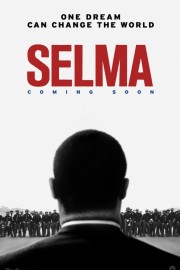Selma
“Selma” isn’t a stuffy, overwrought dramatization of real life, but a film that makes a historic event breathe with life and vitality over again. This is, ultimately, the highest order for a film “based on a true story” or “inspired by actual events”– yes, we should demand historical accuracy of such films, but more importantly, we want to feel like this event is happening right now, as if we are watching it unfold before our eyes. Not every film based on reality can do this, but the best ones– the “Selmas” and “Lincolns” and “Schindler’s Lists” and “Malcolm X’s” –make it look easy, and seamless.
Writer Paul Webb and director Ava DuVernay throw us right into the middle of history. The year is 1965. Lyndon Johnson has just been re-elected in the biggest electoral landslide in history, and a big part of that came from his passage of the Civil Rights Act in 1964 after a series of peaceful protests led by Rev. Martin Luther King Jr. forced his hand into action. Now, Dr. King (David Oyelowo) is pressing Johnson (Tom Wilkinson) for a Voting Rights bill, as well, because even though segregation is outlawed, the discrimination of the Old South remains, with white state employees making blacks jump through absurd hoops just to be put on the voting rolls. Johnson, however, tells King that his hands are tied– in a few years, maybe, but right now, he has biggest fish to fry. King, on the other hand, persists, and along with his loyal activists, chooses Selma, Alabama, as ground zero for his fight to bring further equality to all Americans. Needless to say, there is resistance, but there is also a grass roots movement ready to follow King on this noble quest. How much pain and hatred will they be able to handle, though, to make sure they come out triumphant?
It’s impossible to watch “Selma” without thinking about the recent upheaval in the Civil Rights movement we’ve seen in Ferguson, Missouri, and New York City, among other places, where the deaths of black men at the hands of police have sparked outrage, protests, and polarization. If you can’t see how what is happening now is just another battle in the same war fought in Selma, then you aren’t paying attention. The Civil Rights movement started in the ’50s and ’60s, and led by people like King and Andrew Young and John Lewis and Malcolm X never really ended, but just receded into memory before injustices to the likes of Rodney King, Trayvon Martin, Michael Brown, Eric Garner, and Tamir Rice brought the reality of black life in America back into consciousness, with a recent gutting of the Voting Rights Act Dr. King fought for by the Supreme Court just twisting the knife further, as if the point wasn’t getting across. Systematic racism still exists in America, and while we’ve had our first African-American president for the past six years, the wicked spirit of Jim Crow laws and old prejudices have survived, much to our shame. I’m white, so I have no idea what it’s like to live in America, let alone in the South, as a black person, who has to deal with prejudice, and be concerned about every move they make, even if it’s something as simple as walking home, or playing with friends, every minute of the day. Watching “Selma,” however, I feel like I’m given me a front row seat, and I’m not envious.
The problem with films like “Selma,” a lot of times, comes from an overabundant sense of Importance, with a capital “I.” This is Important, therefore we shall make sure you know it. This is part of why some movies that show the struggles of African-Americans when it comes to our unfortunate history of racism (think “Lee Daniels’s The Butler,” or “Red Tails,” or “Miracle at St. Anna” or “Amistad”) fall short of the type of greatness we see in “Selma”– the importance of the message of the story is underlined and put in bold letters rather than simply allowed to be told on-screen. “Selma” could have easily fallen into this trap, but DuVernay doesn’t let the significance of the events in Selma overshadow the events themselves. Through seeing them unfold, we understand their importance, and they move us even more profoundly as a result. The act of putting them on screen is enough, and DuVernay understands that, and her film is a triumph of an important story, put on-screen, and allowed for us to just experience it. It’s quite an accomplishment that almost feels invisible as we watch it. When we think about it after, though, that’s when the reality of what we just saw comes into view.
There has been a controversy that has grown up around “Selma” with regards to President Johnson’s reluctance, as seen in the film, to push through a Voting Rights bill, even as the situation in Selma seems to devolve. What I personally know in learning about the Voting Rights Act jibes with the way the film presents things, but I’m not a historian, and “Selma,” despite it’s “true story” label, is not a documentary. The important thing is really how we experience it in the moment, and how we think about it after, and in that criteria, “Selma,” which features a stunning performance by Oyelowo as Dr. King; great supporting turns by Wilkinson, Carmen Ejogo as King’s wife, Coretta, and Stephan James as John Lewis; superb craftsmanship from all departments; and a heart rending soundtrack, succeeds as the greatest films do. You can’t ask for better than what DuVernay and her screenwriter have to offer. Few people can deliver it.










